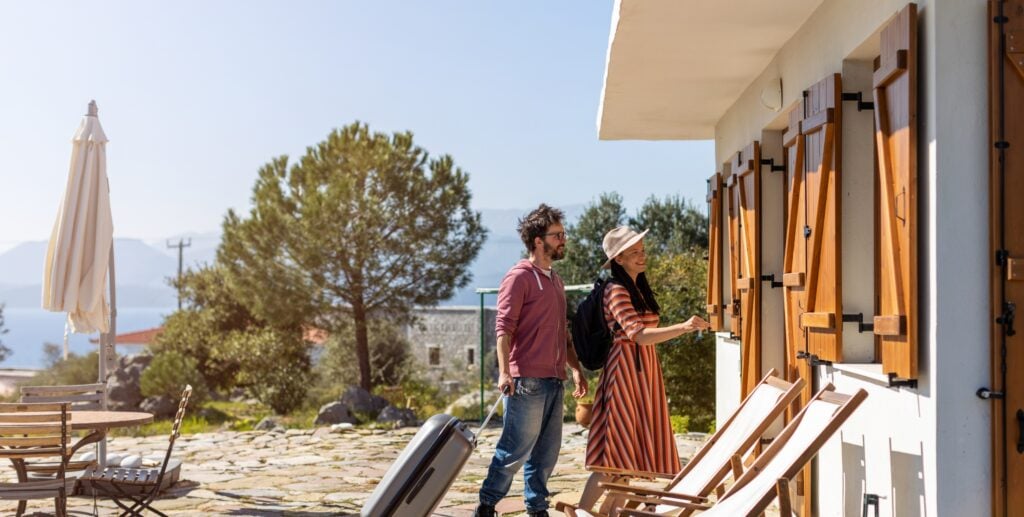A host in North Carolina recently said that one of his habits is refreshing his Airbnb dashboard “way too many times a day,” waiting to see if a sudden dip in views or an unexpected review is about to derail the month.
One week, his listing disappeared from search with no explanation: no significant competition, pricing errors, or alerts. It simply vanished…and then reappeared days later. He described the experience as “working for a boss who never talks to you, but still controls whether you get paid.”
Almost every seasoned host has felt that same jolt of panic. It’s the emotional tax of relying on a platform you can’t control.
That story captures the underlying tone of the PriceLabs Global Host Report, which gathered data from more than 1,400 hosts worldwide. The big takeaway is that hosting today is not the dreamy passive-income fantasy it’s often marketed to be. It is work (sometimes meaningful, sometimes frustrating, usually rewarding), but undeniably work.
Yet the surprising twist in the report is this: Even with all the stress, hosts are overwhelmingly proud of what they’ve built, and most are planning to expand, not retreat.
Hosting is Flexible, But Hard Work
The report found that most hosts spend fewer than 10 hours per week managing their rental, but they happen in the margins of already whole lives. 83% of hosts work another job, so hosting becomes an evening, weekend, or “whenever-I-can-fit-it-in” commitment rather than a neatly defined schedule.
And the work that fills those hours tells the real story.
The tasks that consume the most time are ones that software can’t easily eliminate. Hosts spend the bulk of their energy coordinating cleanings, navigating maintenance issues, handling guest questions and administrative work like taxes and bookkeeping, and keeping up with shifting OTA policies. These responsibilities are unpredictable, often urgent, and emotionally draining.
What actually eats the most host time:
- Administrative work, bookkeeping, and taxes
- Cleaning coordination and maintenance
- Understanding and adapting to OTA updates
- Guest communication, complaints, and problem-solving
- Planning upgrades or new investments in the property
Calendar syncing might be automated, but the messy, human parts of hospitality are not. And that’s where the work truly lives.
Hosts Rely on Airbnb, Even When They’re Frustrated by It
One of the most striking contradictions in the report is that hosts routinely express frustration with Airbnb: its support systems, review policies, and decision-making. That said, after all these frustrations, Airbnb still outperforms every other OTA.
98% of surveyed hosts use Airbnb, and its satisfaction score (4.1 out of 5) is significantly higher than Vrbo or Booking.com. This creates a dynamic that’s both practical and emotional: Hosts depend heavily on Airbnb for revenue, but they don’t entirely trust it.
The data reflects that tension strongly. What hosts worry about most:
- Visibility and ranking on OTAs
- Sudden algorithm shifts
- Guest complaints or unfair reviews
- Inconsistent platform support
When one platform wields that much influence over a host’s income, even small changes feel huge. This is why many hosts describe hosting not as “passive income,” but as “always being on call.”
The Direct-Booking Wave Is Picking Up Momentum
For years, talk about direct booking came mostly from consultants or advanced operators. Now, it’s becoming mainstream.
Direct-booking websites are the No. 1 category hosts plan to invest more in over the coming year, with 30% saying they intend to strengthen or build their direct-booking strategy. I know Mark from Boostly is grinning ear to ear right now.
The motivation is clear. Hosts want:
- More control over who books
- Repeat guests to return without OTA fees
- Protection from fluctuating search rankings
- Better control over cancellations
- A way to build an authentic brand instead of a single listing
This doesn’t mean direct booking is simple. It requires systems, payment processing, guest screening, email marketing, SEO, and a functional website. But the desire for independence is growing, and hosts are recognizing that being “Airbnb-only” puts them in a vulnerable position.
Cleaners and Handymen Are Still the Biggest Bottlenecks
The words “cleaner” and “cleaning” appear 186 times in the free-response sections of the report. Hosts mention cleaners more than pricing tools, market uncertainty, regulations, or even guests. When one part of your operation depends on a handful of local people who may or may not show up, the anxiety never really fades.
Almost half of hosts say finding reliable cleaners is one of their biggest challenges, yet very few plan to invest in turnover technology. The real problem is hiring, managing, and retaining reliable workers, which is something tech can’t fully solve.
This is the one area where even seasoned operators admit they still feel vulnerable.
AI Has Potential, But It Isn’t Reducing Host Workload Yet
Artificial intelligence (AI) is everywhere in the STR conversation right now, but PriceLabs found that its actual impact on host workload remains limited.
Hosts fall into three almost perfectly balanced groups: some embrace AI, some ignore it entirely, and some feel overwhelmed by it. What’s most interesting is that all three groups spend roughly the same number of hours hosting each week. That tells us AI is enhancing quality, but not yet cutting time.
However, hosts do want more guidance from trusted tech companies. Nearly half said they rely on tools like PriceLabs, Lodgify, and PMS platforms to learn better systems and strategies. In other words, the next wave of STR tech won’t just automate tasks; it will teach.
Despite Challenges, Hosts Are Proud and Optimistic
After all the anxiety, platform tension, and late nights and last-minute cleans, this might be the most encouraging part of the entire report:
- 69% of hosts say they’re proud of what they’ve built.
- 41% expect this year to outperform last year.
- 32% plan to expand their portfolio in 2026.
That isn’t the mindset of an industry in retreat. It’s an industry evolving: growing up and becoming more disciplined, more data-driven, and more entrepreneurial.
Many hosts began by listing a spare room or a second home. But as the report shows, a growing number now reinvest in upgrades, track their financials weekly, and treat their STRs as real businesses. Hosting is shifting from a casual side income to a full-fledged operation. And the people who lean into that shift will thrive.
What It All Means for STR Operators in 2026
Hosts are learning that the key to long-term success isn’t luck or timing: It’s professionalism. Pricing strategy, reliable ops, diversified booking channels, and guest experience are becoming the new baseline.
If 2025 was the wake-up call, 2026 is the year hosts step into the role of true operators. The ones who build with intention will be the ones who win.
Winning hosts need to:
- Build strong cleaning and maintenance systems
- Diversify beyond a single OTA
- Use direct booking as a long-term play, not a quick fix
- Embrace tech that saves time without overcomplicating things
- Treat their listing like a business, not a hobby
- Actively study market data, seasonality, and pricing trends



